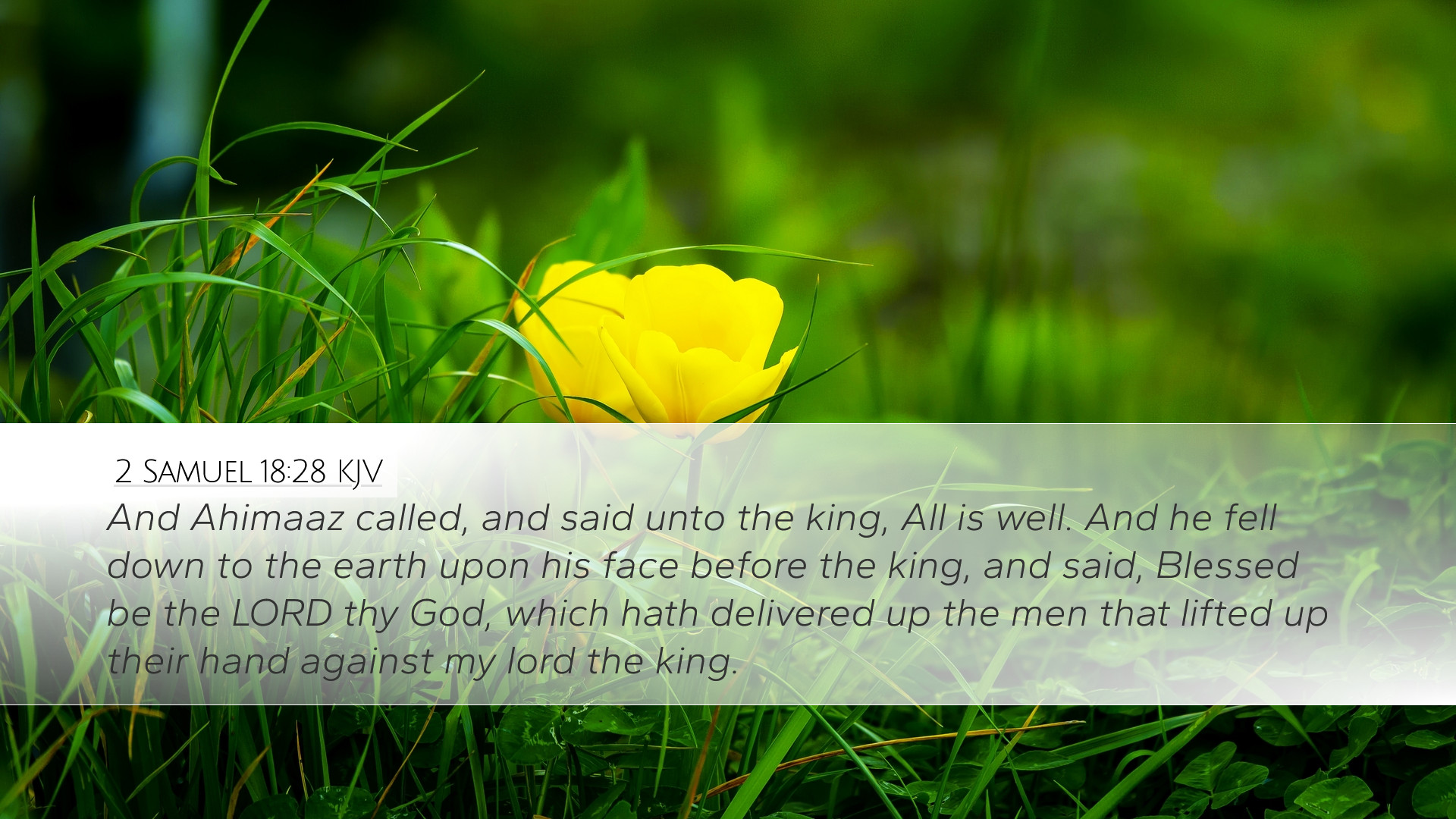Commentary on 2 Samuel 18:28
Verse Context: 2 Samuel 18:28 states, "Then Ahimelech, the son of Abiathar, brought news and said to the king, 'All is well!' And he bowed down before the king with his face to the ground."
Overview of 2 Samuel 18
This chapter serves as a pivotal moment in David's life, capturing the intense culmination of the rebellion led by his son Absalom. It includes significant themes of loyalty, the gravity of conflict, and the emotional upheaval experienced within families and leadership.
Insights from Matthew Henry
Matthew Henry reflects upon the character of the messenger, Ahimelech, emphasizing his dedication to delivering the king's news despite the circumstances surrounding the battle. He highlights the importance of bringing good news, especially in a time of distress for David, who faced the treachery of his own son.
-
Message of Peace: Henry suggests that the phrase "All is well!" carries a deeper significance in the context of warfare, as it underlines the victory and the restoration of peace David so desperately sought.
-
Respect and Reverence: The act of bowing with his face to the ground signifies not only the respect for David as king but also the spiritual recognition of God’s sovereignty even amidst human strife, a theme prevalent throughout the biblical narrative.
Thoughts from Albert Barnes
Albert Barnes expands on the implications of the messenger's role. He illustrates how Ahimelech represents the loyal servant who diligently carries important news that can alter the course of events.
-
Symbol of Hope: Barnes emphasizes that the announcement by Ahimelech symbolizes hope and restoration for David, amidst his grief and turmoil, suggesting a divine intervention in the events preceding the rebellion.
-
Role of the Messengers: The commentary also points out the theological aspect of messengers in the scriptures, noting how they often serve as conduits of God’s will and purpose, bridging the communication between divine intention and human action.
Reflections by Adam Clarke
Adam Clarke, in his commentary, draws attention to the emotional layers present in this interaction. He states that Ahimelech's good news would have been a moment of relief for David, rife with personal stakes and familial heartbreak.
-
Importance of Good News: Clarke notes that in times of distress, the delivery of good news can be as vital as the news itself, reinforcing the notion that messengers often carry the weight of hope.
-
Royal Response: The actions of David, upon receiving the news, reveal much about his character as a leader. Clarke discusses how the king's reaction mirrors his complex emotional state—a blend of relief, worry, and responsibility for his people.
Theological Implications
This verse encapsulates a moment of divine providence amidst human conflict. The acknowledgment of God's hand in the affairs of men is prevalent throughout Scripture, and in this narrative, it reveals God's involvement in the affairs of David, even when turmoil abounds.
-
God's Sovereignty: Each commentary reflects on the overarching theme of God's sovereignty, displaying how He orchestrates events for His purposes. David's trials serve not only as personal tests but as illustrations of God's greater plan for His people.
-
Loyalty and Disloyalty: The story contrasts loyalty, as exemplified by Ahimelech, with the disloyalty of Absalom. This discord within the family serves as a reminder to leaders today about the essential nature of loyalty within their ranks.
Conclusion
2 Samuel 18:28 serves as a profound reminder of the complexities of leadership, the importance of messaging in times of conflict, and the ever-present assurance of God's sovereignty amidst human trials. The insights from Henry, Barnes, and Clarke encourage readers, particularly pastors, theologians, and students, to reflect deeply on the implications of every verse as they engage with the living Word.


